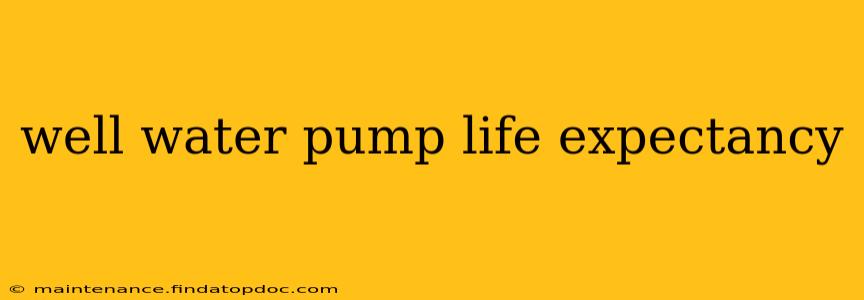A well water pump is a crucial component of any home or business relying on a private water well. Understanding its lifespan is vital for planning maintenance and replacements, preventing costly emergencies, and ensuring a consistent water supply. This comprehensive guide delves into the factors influencing well water pump life expectancy, helping you anticipate and address potential issues.
How Long Does a Well Water Pump Typically Last?
The average lifespan of a well water pump ranges from 8 to 15 years. However, this is just an average; numerous factors can significantly impact longevity. Several pump types exist, each with varying lifespans. Submersible pumps, commonly used in deep wells, often last longer than jet pumps, which are more susceptible to wear and tear due to their location above ground. Regular maintenance, as detailed below, is key to maximizing the life of any pump.
What Factors Affect Well Water Pump Lifespan?
Several factors contribute to the lifespan of your well water pump. Understanding these can help you proactively extend its operational life.
1. Water Quality:
Poor water quality, including high levels of sediment, minerals (like iron and calcium), or corrosive elements, can significantly shorten a pump's life. These impurities can cause abrasion, corrosion, and blockages within the pump's internal components. Regular water testing and the installation of a water filtration system are crucial preventative measures.
2. Pump Type and Quality:
The type of pump significantly influences its durability. Submersible pumps, due to their submerged location, are generally more durable and less prone to damage from extreme temperatures and weather conditions. The quality of the pump itself also matters; investing in a high-quality pump from a reputable manufacturer will often lead to a longer lifespan.
3. Usage and Frequency:
The frequency and intensity of pump use directly impact its wear and tear. A frequently used pump will naturally experience more wear than one used less often. High-demand periods, such as during peak summer months when irrigation is prevalent, can accelerate wear.
4. Maintenance and Repair:
Regular maintenance and timely repairs are arguably the most significant factors affecting a pump's lifespan. Routine inspections, lubrication, and prompt addressing of minor issues can prevent major problems and extend its operational life considerably. Neglecting maintenance can lead to premature failure.
5. Power Supply and Voltage Fluctuations:
Consistent power is essential for optimal pump performance. Power surges or voltage fluctuations can severely damage the pump's motor and internal components. Installing a surge protector can safeguard against these power-related issues.
6. Well Conditions:
The condition of the well itself can indirectly affect pump longevity. Problems like well casing deterioration or sand intrusion can strain the pump, leading to premature wear and tear. Regular well inspections are essential for early detection of potential well-related problems.
What are the Signs My Well Water Pump is Failing?
Recognizing the early signs of pump failure is crucial to prevent a complete system shutdown and potential costly repairs. Common indicators include:
- Reduced water pressure: This is often the first sign of a problem, indicating reduced pump efficiency.
- Unusual noises: Grinding, humming, or unusual vibrations often signal internal component damage.
- Frequent cycling on and off: The pump repeatedly turning on and off can indicate a problem with the pressure switch or pump itself.
- Leaks: Any visible leaks around the pump or its connections warrant immediate attention.
How Can I Extend the Life of My Well Water Pump?
Proactive maintenance is key to extending the life of your well water pump. This includes:
- Regular inspections: Visually inspect the pump and its components for leaks, corrosion, or damage.
- Annual servicing: Schedule annual professional servicing to lubricate moving parts, check for wear, and address any potential issues.
- Water quality monitoring: Regularly test your water quality and install a filtration system if needed.
- Power protection: Install a surge protector to protect the pump from power surges.
- Addressing minor problems promptly: Don't ignore minor issues—address them promptly to prevent escalation.
How Much Does It Cost to Replace a Well Water Pump?
The cost of replacing a well water pump varies considerably based on several factors, including the pump type, well depth, and labor costs. Expect to pay anywhere from $1,000 to $5,000 or more for a complete replacement, inclusive of the pump, installation, and any necessary ancillary components.
What are the Different Types of Well Water Pumps?
Several types of well water pumps exist, each suitable for different well depths and water conditions. Choosing the right pump is crucial for optimal performance and longevity. Common types include:
- Submersible pumps: Located within the well casing, these are ideal for deep wells.
- Jet pumps: Located above ground, these are suitable for shallower wells.
- Centrifugal pumps: These pumps use centrifugal force to move water.
This guide offers a comprehensive overview of well water pump life expectancy and related factors. Remember, proactive maintenance and prompt attention to potential problems are crucial for maximizing your pump's lifespan and ensuring a reliable water supply. Consult with a qualified well professional for any specific concerns or maintenance needs.
